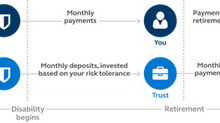Protecting the Most Crucial of Assets
- Joe Russo
- Jul 27, 2023
- 4 min read
The most important and fundamental of critical assets to the continuation and financial success of any American business of any size is not in its fiduciary holdings and intellectual properties, nor is it in the more readily tangible equities like manufactured product, real estate, office equipment and machinery. Arguably, a company’s most important assets are the actual men and women upon which the bottom line depends every day to make all of the many pieces fit and the wheels to continue to turn. Those that actually drive the business, the leaders, the rainmakers, they are the key persons of significant consequence.
Key persons may be business owners or even employees that play special and specific roles, with immediate influence on corporate prosperity and balance. They are the rainmakers and the decision makers.
In the realm of corporate America, the term “rainmaker” holds substantial clout, influence and respect. Defined as “a person who generates income for a business or organization by brokering deals or attracting clients or funds”, a rainmaker is a key employee or key business owner, usually a go-getter who is mainly responsible for a firm’s incoming new business and the retention of major accounts. They are integral to the present and future of organizations built upon foundations of strong outside relationships and growth of corporate accounts.
As insurance professionals we must dutifully contemplate and analyze the risk and potential corporate financial loss associated with the demise of a key person. A loss of such personnel not only immediately affects corporate profitability, but also productivity, customer relations, employee morale and in general, overall business effectiveness and efficiency.
The unexpected death of a key person is an obvious peril that requires attention and financial safeguards that can be addressed with the many available term or permanent forms of life insurance vehicles. But what about the occurrence of a serious, unforeseen event that results in not the death of a key person, but the physical incapacitation of such an important individual?
Now please allow me to digress momentarily and pose to you a simple, straightforward question with the intent of you placing emotion aside. What would happen to your business specifically if you became disabled from an accident or illness, and you were unable to work for a period of time or even at all ever again? Now I want you to really try to give this some sincere, unbiased thought, and imagine the horrific consequences from a business perspective.
If you are an independent agent, advisor or an agency owner, the probable answer is that you would have to attempt to sell your book of business quickly or let your staff go and close-up shop to keep from hemorrhaging capital. If you are an employee of a larger outfit, your inability to personally manage your accounts could cause great financial detriment, mostly in the short term, to those who employ you. Take a moment to realize that your clients, no matter their industry and line of work, likely face similar if not the same potential predicaments. What happens when a business’ key person becomes disabled? The simple answer is that the business suffers to the point of economic devastation.
The physical loss of a key employee or employer will most likely lead to the loss of present and future business accounts, the loss of relationships with crucial contacts, not to mention the office workflow issues that would inevitably arise. Furthermore, corporate capital and savings could have to be allocated to finding a suitable replacement employee who would then need to be trained and paid an appropriate salary. The actual costs of the loss of a key person due to disability can easily put a company into significant chaos both operationally and fiscally.
Insurance becomes essential in the preservation of such an important corporate presence, providing fiduciary safeguards in case of the tragic loss of a key person. As previously mentioned, life insurance is an important option and typically the first choice of advisors and company management. But as critical, if not more, to business financial and succession planning is disability insurance. Common statistics dictate that a key employee is at least three times more likely to become disabled during a working career than perish during that same time period. Financial indemnification of the unexpected loss of key personnel to disablement must be paramount.
The product provides protection against the loss of cash flow and the typical increase in operation costs associated with the short and long-term disablement of persons key to business operations.
Key person DI benefits may be used at the discretion of the employer or management with common applications of benefits for covering recruiter expenses to find temporary or permanent personnel replacements as well as reimbursing losses due to reduced productivity of failing or failed accounts. Benefits are also used to provide travel expenses for new account managers who attempt to keep marquee clients on the books as well as supplementing overtime payments for existing staff who are temporarily covering the inevitable additional workload.
Although it is difficult to succinctly place a completely accurate dollar amount on the overall value of an influential figure, key person disability insurance is the most flexible, robust and appropriate tool in a business financial planning portfolio, providing generous and much-needed cash flows to firms reeling from the loss of critical personnel. Key person DI is essential in minimizing business risks and ultimately in facilitating business continuity.










































Comments